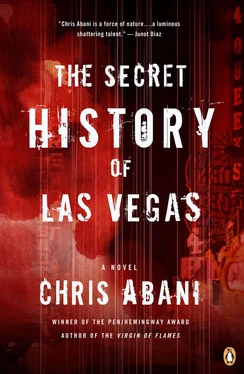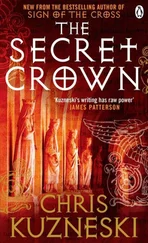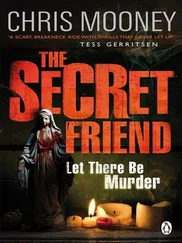The walls inside were made of wood and every surface was covered with old coasters sporting beer logos. The floor was a mix of cork, sawdust, bare concrete, and fraying rugs. Where the roof sloped at the back into what looked like an anteroom, two decrepit and rickety pool tables sat, their racked balls gathering dust in the gloom. Behind the bar, bottles of liquor struggled for ascendancy. There were two taps — Budweiser and Heineken. A small pug-faced dog squatted on the bar top drinking milk from a saucer.
It seemed like everything inside, even the air, was coated with grime, determined dirt that nothing would ever clean. Sunil instinctively reached into his pocket for his handkerchief.
Put that away, Salazar said, settling onto one of the barstools. You’re embarrassing me.
Sunil ignored him, dusting the barstool before sitting down.
The bar was far from full, but nowhere near empty. There were a few men and women littered around, drinking by themselves or with one another. Sunil guessed they were regulars.
Heineken for me, and whatever my friend is having, Salazar said to the barman.
Same, Sunil said.
We’ll also take two burgers with fries, Salazar added.
The barman, a sour-faced man about fifty with long, stringy, greasy blond hair balding at the crown, a faded denim shirt, and jeans stiff with dirt, dipped some glasses in water, shook them out, and pulled a draft for each man without saying a word.
Listen, Salazar, Sunil said. I want to ask you something personal.
What?
Have you ever been married? Any kids? Do you have a girlfriend?
No to all three, Salazar said.
May I ask why?
We’ve known each other two years and we never had this conversation before. Odd. I don’t do well with women. What about you?
No. I’ve never been married, but I do have a girlfriend of sorts, Sunil said.
A man, drinking by himself at a table in the corner, got up and walked over to them. He had the heavily muscled look of a recent ex-con and all the black spidery tattoos of prison.
We don’t get many new faces around here, he said.
You trying to violate your parole, Salazar asked. Fuckers like you are always on parole.
The barman came back with two burgers and fries. Salazar put a fry in his mouth, got up, and walked across the room to the jukebox. Selecting a Charley Pride record, he shoved some change in and came back to the bar. The music transported Sunil back to the shebeens of Soweto as he ate. Packed full of sweaty, desperate men and women drowning unspeakable sorrows in the homebrew so strong it could take your voice with one shot.
After White Alice left, Sunil picked up a job at a shebeen. It was owned by Johnny Ten-Ten’s uncle Ben, and Ten-Ten arranged it for Sunil out of sympathy, and for Nurse Dorothy’s sake, he said. Sunil went to school and came straight to work at the shebeen every day until about eight p.m., and then after a dinner of Bunny Chow with Uncle Ben, he went home to do his homework. The money from the bar helped him pay the rent and keep the house Dorothy had worked so hard for. He imagined she would get better and come home to live there with him. He was fourteen.
Three years passed like that. Sunil worked washing glasses, sweeping floors, and running errands. And then dinner with Uncle Ben, always Bunny Chow; he ate it so much he came to love it too — the way the lamb stew soaked its way through the hollow chamber of the loaf of bread. Bunny Chow and Cokes; he could have as many Cokes as he wanted, but no alcohol. Uncle Ben was strict about that.
Never drink this shit, Sunil, he would say, spitting through the holes where several teeth used to be. It will rot your liver, your brains, and your soul.
But you drink it, Sunil said.
So now you have proof of what I’m saying, Uncle Ben said, laughing.
Every day they played this game, and yet somehow Sunil never got tired of it.
One day, Ben asked Sunil to stay late and help him close up. Ben had never asked before, so Sunil stayed. He had never seen the bar this late. It looked different, felt empty, everything sounding hollow. The music was off, and what little sound there was, in the harsh lighting, was amplified: the swish of Sunil’s broom across the floor, the grating of metal chairs being pulled across concrete and then stacked, the insistent buzzing of flies around pools of spilled beer and bits of food, the tap running as the metal cups were washed by Ben’s wife, a dog in the distance barking to the ghosts of night, a Casspir rumbling by on patrol a few streets away.
But it was the two or three drunks who wouldn’t leave who fascinated Sunil. They sat, heads hung over the dregs of their drinks, holding on to the metal mugs as though drowning. Several times Ben came out and asked them to leave. Still they sat as though afraid of the night and the silence beyond it.
It’s like this every night, Ben said with a sigh. Usually Ten-Ten is here to get them out.
I’ll get them out, Sunil said.
Ben nodded.
Two of the drunks left easily enough when Sunil pried them up and gently shoved them out into the dark street. The third, a regular he knew only as Red, was harder to get out. Sunil could barely pry his fingers off the metal mug, and his butt seemed glued to the chair. Red was a small man and Sunil couldn’t figure out where he got the strength.
Please, Red begged. Please, it’s too damn lonely out there, bruh. You can’t send me out there.
Go home, please, we have to close, Sunil said.
No, no, you don’t understand, Red begged. They come every night, every night they come and I can’t, man, I can’t. I know you’re young, but surely you understand.
Go home, Red, Ben said from across the room. It’s the same every night. Go home.
Who comes every night, Sunil asked. The police?
My wife, Red sobbed. My wife and my boy, they come every night.
Go home, Red, Ben said. The boy doesn’t need your stories.
But he should hear them, Ben, then maybe he’ll understand.
Go home, sir, Sunil said.
I only informed on a couple of undesirables, Red babbled. Only a couple of times on criminals we all hated. Then I tried to stop, I did. I told the police I was no longer informing for them. So they told the ANC boys about me and they took my wife and my son to teach me a lesson. They just took them. I wasn’t there. I was here. I was here.
Go home, Red, Ben said again, this time crossing the room and pushing him gently to the door.
Where, Sunil asked. Where did they take them?
Red stood at the door of the shack, a bent shade of a man, bent even lower by the alcohol. He lifted a trembling finger and just pointed. Into the dark, man, into the night, he said.
Ben stepped up and gave him one last gentle but firm shove and shut the door. Finish up, he said to Sunil, and went back to the bar.
Finish up, Salazar said, nudging Sunil. We have to get back on the road.
Yeah, sorry, I was lost there for a moment, Sunil said.
There was a quality to dusk that Sunil liked. There was something frenetic about it — a grouse disturbed from the brambles, or even a chicken with its brood struck by the shadow of a circling hawk. As though day, like Wile E. Coyote, had just run off the edge of a cliff and was winding his legs in space, desperately trying to keep moving before falling into night. But there was something else too, something besides the surprise. Something that had the quality of a dimly lit stage set just before the curtains rise on opening night. There was a rhythm to it, a beckoning, and a bittersweet tear in time.
Ruins too held that tear in time, that melancholic yearning, when detritus clings obstinately to a past that can no longer be and yet is unable to fall into the disintegration of a new thing. A lonely feeling.
Читать дальше












